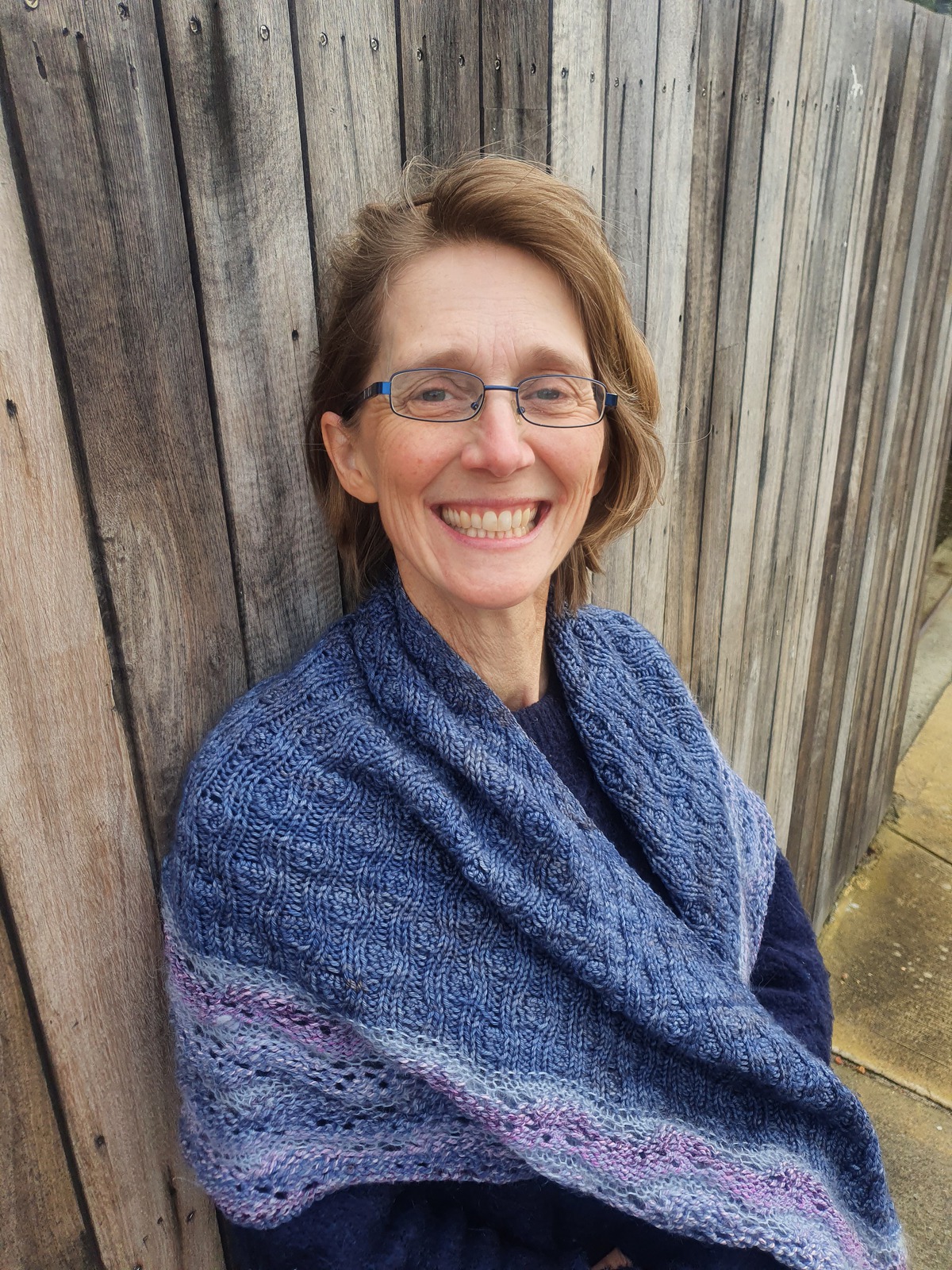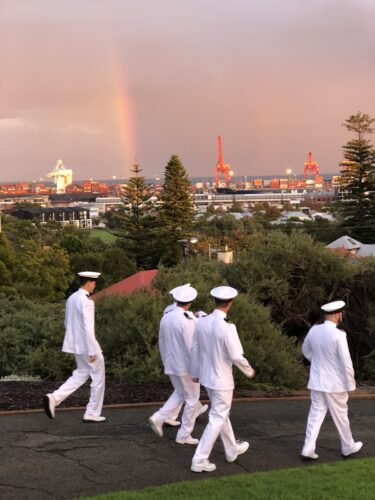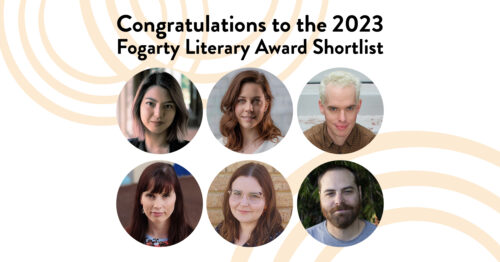A judge’s thoughts on what it takes to get noticed in a novel-writing competition

The Reading Pavilion
’Tis the judging season at Fremantle Press. It is also Djeran – the Noongar season when the long hot days give way to moody clouds and rain blowing in from the west. On Saturday and Sunday, as I enter the final stretch of the Fogarty Award judging campaign, I set up a Reading Pavilion in the garden. The dog joins me in a supportive kind of way. The following Tuesday is Anzac Day when the Pavilion is exchanged for a reading couch and hot water bottle. At the dawn service, steady rain falls. Navy personnel stand out white in the darkness. Len Collard reads the Ode in Noongar and kaa-kaas high in the trees begin their call (kaakawiny is the Noongar word for laugh) as the sky grows soft pink, smudged with a curtain of rain.

At the dawn service, there are stories, of course, about how the events at Gallipoli forged our national character – as if the narrative of that single event leaked into a void where before there was no rabbit stew or lamingtons or charity balls or trams, or bodies down mineshafts, no imprisonment or lice or convict labour, no sweat and tears, no toppling of trees, no massacres. As if, throughout time, people in this country hadn’t told (or chose not to tell) the stories of who we are.
‘There is always more that unites than divides us,’ the mayor says as she ends her story of two men in the war, and the dripping crowd is quiet on the squelchy hill.
The stories we tell give meaning to our lives. They create a narrative around random events and help make sense of things. Whether fiction or non-fiction, they open up a space in which empathy can reside. They are the means by which we enter others’ lives and experiences, especially if they are told well. A story that does not connect leaves no residue. Other stories can stay with us forever.
This year, a relatively modest field entered the Fogarty Literary Award – not quite thirty manuscripts in all. But the resulting shortlist is one-fifth of that entire field: the longest yet.
I spoke to Brooke Dunnell – who was the third judge of this year’s Fogarty along with children’s publisher Cate Sutherland and me – about what it was in the shortlisted novels that stood out for her. Brooke won the 2022 Fogarty Literary Award with her novel The Glass House. She has previously judged published works in the Western Australian Premier’s Literary Awards, as well as short fiction competitions. Brooke was curious to see what would rise to the top, and why. While many entries were characterised by enthusiasm, competence and evidence of a dedication to complete a book-length work, what caught her attention in certain manuscripts was a freshness in perspective, an unexpected way of looking at the world.
On reading
In my role as publisher and editor, I do all kinds of reading. During initial assessment, I read to see if a manuscript will be a good fit for our list. After contracting, I review and edit a work to make suggestions of a structural kind that pays attention to the author’s intention as well as plot and chronology, and what text should go where. I read again as I conduct a line edit, checking for ambiguities of expression and surplus or missing material, consistency and style. I copyedit for grammar and punctuation. After proofreading, I read again, taking in corrections for typos and errant commas, missing folios or running heads, and tidying up any wide lines and tight lines.
When my workday is done, I read published books for pleasure, relieved my input is not required but perhaps also noting some aspect of the craft that helps resolve a conundrum I’ve been pondering elsewhere.
I am a reader by vocation and inclination. I connect to the world through words. I interrogate menus and real estate copy. I think about lyrics in songs. In my downtime, I take photos of words that bring me joy. I am always thinking about what makes writing work and delighting in writing gone wrong.


On good writing
What is ‘good’ writing anyway? When I asked Brooke, she defined it this way: ‘There is a confidence and assurance in the work. You can sense the effort in it, and that the writer has thought deeply not only about the work as a whole but also about every sentence it contains. These are writers who pay attention to their readers. Thought has gone in not just to the matter of how the writer sees the world, but how they can help the reader see it too.’
Any manuscript that makes its way to the shortlist represents many writing hours before the writer has even formed the first sentence in the work at hand. For this reason, some manuscripts feel more mature than others – they have been created by a combination of ability, conceptualisation and seamless delivery. In such works, readers can cease to navigate individual sentences and fall on through to the story.
No manuscript is flawless, but raw material can still shine with promise. We know this writer knows what they are doing: we trust how sentences are put together even if the larger work requires more editing time.
When judging, I am reading, and I am also paying attention to the scaffolding of the work. I look at how it has been put together, the ways in which the characters are introduced to us, where the author has chosen to begin the tale. If everything is working, I think less about these things and just enjoy the story. But I find myself resisting immersion when the choice of lexicon and syntax make the work feel like a colour-by-numbers painting. It is true that good sentences make good stories.

Finding the shortlist
There are many ways I know I am about to read a story that will take me somewhere I have never been before. Take my Saturday encounter with a manuscript called The Skeleton House, which I read from start to finish in the Reading Pavilion:
Sweat rolled down my spine and I shivered. The desert sun bore down on us, though it was cooler today than it had been all week – ninety-seven with a light breeze. Out in the hills beyond, the lizards would scamper from creosote bush to creosote bush, their tails leaving winding trails through the orange sand with the tick-tick of footprints on either side.
I was annoyed I’d missed the polygs. A couple times a year, I see the women and girls at Walmart in Mesquite. They wear Little House on the Prairie dresses and have 80s bangs which emerge as an atomic puff over their foreheads. They peer at me in wonder – the heathen in denim – their little heads stacked into a totem pole at the corner of the aisle.
Two pages into the manuscript and the information stacked into these paras could not be fuller: indirectly and in the most interesting of ways, I know where we are, the weather, the geographical and cultural landscape, and some tantalising details about the speaker. Already I feel uneasy, but I don’t know why. I buckle up and read on.
I also know we are in (excellent) trouble when I begin to read Jasper Cliff:
The perentie blinks at the Prado screaming towards it through a carmine-red curtain of dust but doesn’t move. When in danger, it roots itself to the baking dirt road. Once realising he’s not going to straddle the goanna, but plough its head into the gravel, Toby pulls on the steering wheel too hard. The cab tilts ever so slightly but he doesn’t feel the world tip off its axis. Instead, he watches a falcon swing in and claw at the perentie.
Like mythic figures in an endless struggle, the two lock claws for the briefest moment. Falcon and goanna. As the Prado swings out of control, and Toby’s relieved to see he’ll miss them both, he wonders how long this battle has been playing out. How far back through time these skirmishes could be traced across the mulga country’s itchy, rumpled skin.
These sentences have gothic noir written all over them – timeless battles, unforgiving landscapes, strife brewing. The world conjured by this author is tense and troubling.

In A Wreck of Seabirds, the brooding sea and a deserted island conjure a different kind of Australian gothic. From the moment of encountering Ren standing knee-deep in the ocean, I am like the character Briony – I need to know what’s wrong:
‘Hey,’ she said, and his gaze flickered back to hers. He was a full head taller than her. She stepped around him, so that her body stood between his and the sea. The water was past her knees, biting cold. She felt strands of seaweed cling to her legs. She reached out her other hand, gripping his arms. ‘What’s your name?’
He drew in a deep breath, as though he wasn’t sure of the answer.
‘Ren.’ A flicker of recognition surfaced somewhere beneath Briony’s anxious concern.
‘Ok, Ren. I think—’ What was she doing? ‘I think you should get out of the water.’ He stared down at her. His expression was tight with uncertainty. She tightened her grip on his arms, hoping he wouldn’t pull away. ‘Will you come somewhere with me?’
His face twisted—he almost looked angry—and then fell soft. ‘Okay.’ His stance relaxed, as though he’d reminded his body how to move. He spoke again, louder. ‘Yes, okay.’
Briony exhaled. The relief made her want to laugh. ‘Okay,’ her fingers flexed on the damp fabric of his sweatshirt, ‘good.’
In a similar way, my introduction to the characters in The Dreamers makes me want to join a couple of young men on their way to try to get work at a party where wealth and privilege are on full display. These are young men I like immediately:
Lachie had made the long walk from the train station look like a stroll in the park. He had not a hair out of place, whereas Winston looked like he’d been wandering the jungle for a week. His hair was plastered over his eyes. He tried to relax back into a walk, but his father’s old brogues struggled to get a grip on the lawn. Lachie flashed a grin at Winston by way of reply. He pushed his way through one of the side gates, bold as anything.
It’s 1937, I know the second war is looming, and that the boy is about to meet the girl. We think we know how this story goes – but do we really? The pleasure here is in finding out, and finding all the ways it doesn’t.

Days later, as the rain crashes down, I am on the couch and tumbling into The Anatomy of Witchcraft:
Hemlock Widdershins was shaken awake by his mother. There was a hardness in the line of the Admiral’s mouth that meant she was livid.
Every bit of Lock hurt. The skin of his face and hands felt strangely raw. He blinked through the light and realised he was not in his room in Strongbone House, but in a narrow bed in the Wyvern College infirmary, and still in his muddy rugby kit. There were dried flakes of dirt and blades of grass in the thin white sheets.
A wave of nausea overcame him as he struggled to sit up. He reached for the water on the bedside and gulped down the entire jug far too fast. Admiral Widdershins turned away in disgust, folding her arms as Lock retched and coughed.
This manuscript is shooting off welcoming sparks in all directions – a boy by the name of Hemlock Widdershins? A mother who is also a disgusted admiral? A rugby-battered boy in an infirmary? All the promise and allure of boarding school magic with fresh new characters. Do I want to read on? Absolutely!
Then, Nock Loose has an innate confidence in the way it delivers its material. I know as soon as I encounter it that the ride is going to be wild:
They blast Cold Chisel and kick-off hell. The song choice is on the nose but they’re not subtle people. Aren’t meant to be. Five men dressed as knights, drunk on whiskey and violence, tear through the darkness in a beat-up ute. Two sit up front cranking the music as they slide further and further into hysterics. The other three stand on the ute bed: one holds a flaming torch steady so that the other two can light the kerosene-soaked cloth tied to their arrow shafts. They nock, draw, loose:
Nock.
Draw.
Loose.
Nock.
Draw.
Loose.
Nock.
Draw.
Loose…
…an inferno.They can feel the heat through their chainmail as they speed off into the night.
Half the countryside goes up. Five families lose their homes. Firefighters battle the blaze for the better part of a week. The news says it’s the worst fire to hit Bodkin’s Point since The
Summer of Ash in ‘69, a summer best forgotten. The flames got as far as the new skate park,
warping the half-pipe and making it unusable—a relief to some.
Want a little mayhem, the story asks? You got it. And there is no better way to write mayhem than when your sentences display such perfect control.
Each of the manuscripts on this year’s shortlist exhibit a kind of campaign maturity – the sense that this is a person with an innate ear for language and with hours of writing time behind them. Moreover, these are writers who have told the kind of story that complements their abilities. This can be another reason their work succeeds.
What is the value of competitions, anyway?
Even for the reading-fit, it takes some effort to judge a book-length competition, but it is a role we take seriously because we think it can be an important milestone in a writer’s life. What difference did winning the Fogarty make to Brooke? In a word, she says, ‘Everything.’
‘It gave me confidence,’ Brooke adds. ‘It strengthened my connection with the literary community. It gave me a sense of purpose and identity because it solidified my notion of myself as a writer. It opened me to all sorts of industry opportunities: travelling, meeting other writers, training in podcast presentation and social media, and insight into the way things work.’
She says because the Fogarty is an award for Western Australian residents only, it means the writer is part of a smaller pool. With it comes the $20,000 prize money and publication, as well as a wealth of mentoring and opportunities via Fremantle Press and through working as an ambassador for the Fogarty Foundation.
‘What’s not to like?’ Brooke says. ‘If you haven’t entered before, start planning now and use that deadline as a reason and a discipline to enter the 2025 award.’
I finish my Saturday of the readathon in the Reading Pavilion in tears. I have been mostly just sitting on a beanbag for six hours, but some heartbreaking things have taken place in the course of my day. The dog wanders off, but I sit awhile, staring into the deep sky, not thinking, really, but in a kind of a daze, wondering what just happened?
The answer, of course, is a story just happened, and it’s going to take me a little while to leave the Pavilion and appear in the world again.



